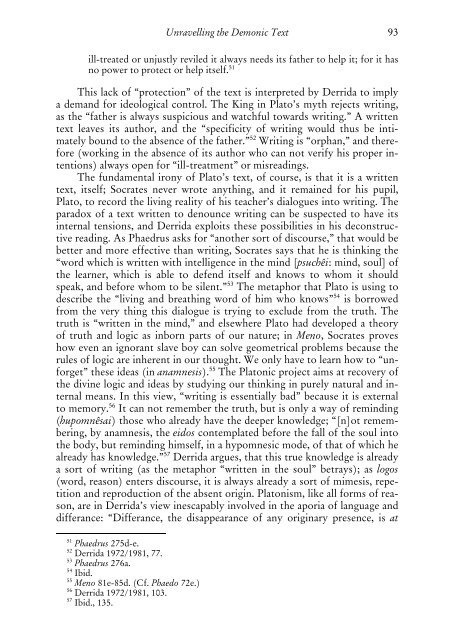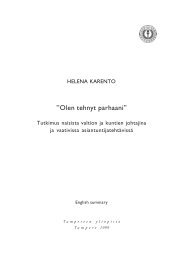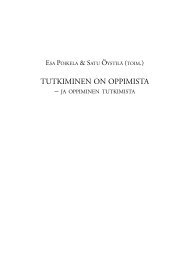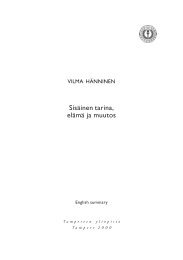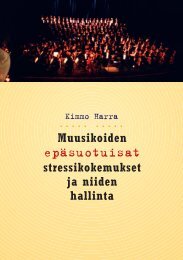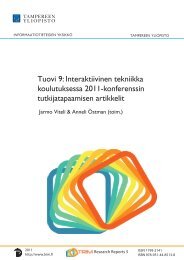Note on this edition: this is an electronic version of the 1999 book ...
Note on this edition: this is an electronic version of the 1999 book ...
Note on this edition: this is an electronic version of the 1999 book ...
Create successful ePaper yourself
Turn your PDF publications into a flip-book with our unique Google optimized e-Paper software.
Unravelling <strong>the</strong> Dem<strong>on</strong>ic Text 93ill-treated or unjustly reviled it always needs its fa<strong>the</strong>r to help it; for it hasno power to protect or help itself. 51Th<strong>is</strong> lack <strong>of</strong> “protecti<strong>on</strong>” <strong>of</strong> <strong>the</strong> text <strong>is</strong> interpreted by Derrida to implya dem<strong>an</strong>d for ideological c<strong>on</strong>trol. The King in Plato’s myth rejects writing,as <strong>the</strong> “fa<strong>the</strong>r <strong>is</strong> always suspicious <strong>an</strong>d watchful towards writing.” A writtentext leaves its author, <strong>an</strong>d <strong>the</strong> “specificity <strong>of</strong> writing would thus be intimatelybound to <strong>the</strong> absence <strong>of</strong> <strong>the</strong> fa<strong>the</strong>r.” 52 Writing <strong>is</strong> “orph<strong>an</strong>,” <strong>an</strong>d <strong>the</strong>refore(working in <strong>the</strong> absence <strong>of</strong> its author who c<strong>an</strong> not verify h<strong>is</strong> proper intenti<strong>on</strong>s)always open for “ill-treatment” or m<strong>is</strong>readings.The fundamental ir<strong>on</strong>y <strong>of</strong> Plato’s text, <strong>of</strong> course, <strong>is</strong> that it <strong>is</strong> a writtentext, itself; Socrates never wrote <strong>an</strong>ything, <strong>an</strong>d it remained for h<strong>is</strong> pupil,Plato, to record <strong>the</strong> living reality <strong>of</strong> h<strong>is</strong> teacher’s dialogues into writing. Theparadox <strong>of</strong> a text written to denounce writing c<strong>an</strong> be suspected to have itsinternal tensi<strong>on</strong>s, <strong>an</strong>d Derrida exploits <strong>the</strong>se possibilities in h<strong>is</strong> dec<strong>on</strong>structivereading. As Phaedrus asks for “<strong>an</strong>o<strong>the</strong>r sort <strong>of</strong> d<strong>is</strong>course,” that would bebetter <strong>an</strong>d more effective th<strong>an</strong> writing, Socrates says that he <strong>is</strong> thinking <strong>the</strong>“word which <strong>is</strong> written with intelligence in <strong>the</strong> mind [psuchêi: mind, soul] <strong>of</strong><strong>the</strong> learner, which <strong>is</strong> able to defend itself <strong>an</strong>d knows to whom it shouldspeak, <strong>an</strong>d before whom to be silent.” 53 The metaphor that Plato <strong>is</strong> using todescribe <strong>the</strong> “living <strong>an</strong>d breathing word <strong>of</strong> him who knows” 54 <strong>is</strong> borrowedfrom <strong>the</strong> very thing <strong>th<strong>is</strong></strong> dialogue <strong>is</strong> trying to exclude from <strong>the</strong> truth. Thetruth <strong>is</strong> “written in <strong>the</strong> mind,” <strong>an</strong>d elsewhere Plato had developed a <strong>the</strong>ory<strong>of</strong> truth <strong>an</strong>d logic as inborn parts <strong>of</strong> our nature; in Meno, Socrates proveshow even <strong>an</strong> ignor<strong>an</strong>t slave boy c<strong>an</strong> solve geometrical problems because <strong>the</strong>rules <strong>of</strong> logic are inherent in our thought. We <strong>on</strong>ly have to learn how to “unforget”<strong>the</strong>se ideas (in <strong>an</strong>amnes<strong>is</strong>). 55 The Plat<strong>on</strong>ic project aims at recovery <strong>of</strong><strong>the</strong> divine logic <strong>an</strong>d ideas by studying our thinking in purely natural <strong>an</strong>d internalme<strong>an</strong>s. In <strong>th<strong>is</strong></strong> view, “writing <strong>is</strong> essentially bad” because it <strong>is</strong> externalto memory. 56 It c<strong>an</strong> not remember <strong>the</strong> truth, but <strong>is</strong> <strong>on</strong>ly a way <strong>of</strong> reminding(hupomnêsai) those who already have <strong>the</strong> deeper knowledge; “[n]ot remembering,by <strong>an</strong>amnes<strong>is</strong>, <strong>the</strong> eidos c<strong>on</strong>templated before <strong>the</strong> fall <strong>of</strong> <strong>the</strong> soul into<strong>the</strong> body, but reminding himself, in a hypomnesic mode, <strong>of</strong> that <strong>of</strong> which healready has knowledge.” 57 Derrida argues, that <strong>th<strong>is</strong></strong> true knowledge <strong>is</strong> alreadya sort <strong>of</strong> writing (as <strong>the</strong> metaphor “written in <strong>the</strong> soul” betrays); as logos(word, reas<strong>on</strong>) enters d<strong>is</strong>course, it <strong>is</strong> always already a sort <strong>of</strong> mimes<strong>is</strong>, repetiti<strong>on</strong><strong>an</strong>d reproducti<strong>on</strong> <strong>of</strong> <strong>the</strong> absent origin. Plat<strong>on</strong><strong>is</strong>m, like all forms <strong>of</strong> reas<strong>on</strong>,are in Derrida’s view inescapably involved in <strong>the</strong> aporia <strong>of</strong> l<strong>an</strong>guage <strong>an</strong>ddiffer<strong>an</strong>ce: “Differ<strong>an</strong>ce, <strong>the</strong> d<strong>is</strong>appear<strong>an</strong>ce <strong>of</strong> <strong>an</strong>y originary presence, <strong>is</strong> at51 Phaedrus 275d-e.52Derrida 1972/1981, 77.53 Phaedrus 276a.54 Ibid.55Meno 81e-85d. (Cf. Phaedo 72e.)56 Derrida 1972/1981, 103.57Ibid., 135.


